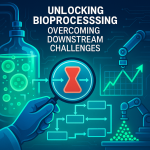🔍 This method merges machine learning with experimental data, improving predictions in low-density datasets.
⚗️ It enhances process development, cutting down experimental needs.
💡 Their findings show a predictive accuracy boost of 6-41% across various data densities, aiding early-stage biopharmaceutical processes.
Introduction:
The article discusses advancements in the design space prediction for monoclonal antibodies (mAbs) through a hybrid modeling approach that incorporates machine learning. This novel method enhances the accuracy and reliability of predictions, especially in scenarios involving low-density datasets, and demonstrates potential for expediting biopharmaceutical process development.
- Traditional mAb design space identification methods are limited by high costs and reliance on either wet-lab experiments or insufficient in silico models.
- Researchers from Imperial College London and GSK developed a hybrid approach that integrates data-driven experiments with machine learning to improve predictive capabilities.
- The study focused on using a machine learning-enhanced in silico model for single-column antibody Protein A affinity chromatography, which is pivotal in determining mAb design space.
- By pretraining an artificial neural network on synthetic data, researchers effectively augmented limited wet-lab data, resulting in a more robust predictive model.
- The hybrid model demonstrated a significant enhancement in predictive accuracy, improving outcomes for low and medium-density datasets while providing better agreement than purely data-driven approaches.
Conclusion:
The findings underscore the efficacy of combining machine learning with experimental data to create a hybrid model that improves the reliability of mAb design space predictions. This approach not only alleviates the dependency on extensive process knowledge but also holds promise for advancing early-stage biopharmaceutical development, paving the way for more effective and efficient drug design processes in the future.



